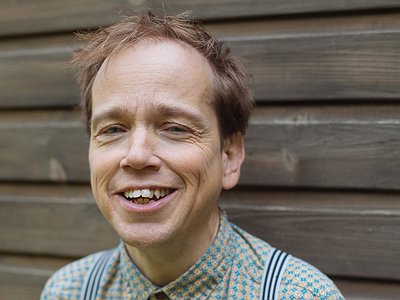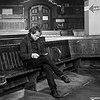Part 1
Name: Ed Dowie
Occupation: Musician/ Composer
Bands & Projects: Brothers In Sound
Current Release: The Uncle Sold on Lost Map Records
Musical Recommendations: Nick Hart (Nick Hart Sings Eight English Folk Songs)/ Pictish Trail (Future Echoes), a pop record about death, and is equal parts bonkers and beautiful.
If you enjoyed this interview with Ed Dowie, you can find more information and recent updates on his Facebook page.
When did you start writing/producing music - and what or who were your early passions and influences?
I started writing music in my late teens, when I and a couple of friends started a band called Brothers In Sound. As a child, I’d been in the lucky position of growing up in a very musical environment. My dad is an amazing musician and taught me to play the organ & piano, plus I sang in a church choir. I think a lot of my musical sensibilities are derived from him. He’s also a composer, and I always loved the elements of his music that I didn’t hear anywhere else. They have a real tangibly unique quality, which, to me was unmistakably his.
For most artists, originality is first preceded by a phase of learning and, often, emulating others. What was this like for you? How would you describe your own development as an artist and the transition towards your own voice?
I like to think it’s possible to separate my musical learning into three distinct phases: first, my experiences of learning and playing mostly classical music as a child; second, discovering how to be in a band and recording & producing pop music with Brothers In Sound; then third, going on to study experimental music at university and focusing on a lot more of the technological and theoretical side to music and art. I guess the phase that I’m now in is my attempts to try to bring these three parts together, in order to produce work that is hopefully unique and interesting, and represents where I exist in relation to these different worlds.
What were your main compositional- and production-challenges in the beginning and how have they changed over time?
When I first started attempting to compose and produce music in the late 90s, we were recording on 4-tracks and other minimal equipment. I’m really glad I started using this sort of technology, as I learnt the value of giving yourself limitations (such as being restricted to 4 channels), but it was advanced enough that it didn’t require much specialist knowledge to operate, unlike earlier equipment. I think it is possible to create interesting music, whatever you have available, but current technology obviously gives you so many more options. I still don’t have very much hardware, which is partly due to financial considerations, but the options available with just a laptop now are seemingly endless. That is one of the most incredible things about making music now, compared to 20 years ago. I think I’d probably like to get some more equipment at some point (who doesn’t want more toys?), but for now it’s pretty much software-based.
Tell us about your studio, please. What were criteria when setting it up and how does this environment influence the creative process? How important, relatively speaking, are factors like mood, ergonomics, haptics and technology for you?
I have a studio space in a rehearsal room in Haringey, North London. It’s just a little room with no windows in an industrial estate unit, but it’s really brilliant. I don’t have to worry about anyone overhearing what I’m doing, and I think that might be the most important thing. I’ve realised that I need to lock myself away from everything: the world, distractions, other people. Having a space that I go to regularly is also invaluable, as it sets up a routine for work. I recently had the opportunity to move studios to somewhere that aesthetically was much nicer, and was part of a community of other musicians, but I realised that the privacy and exclusion (certainly at the moment) were much more important to me. I might be mistaken (how do I know unless I try?), but I feel that shutting myself away from everything is just my way of working.
What are currently some of the most important tools and instruments you're using?
Apart from the piano (and it’s amazing to actually have a physical instrument that is separate from the computer) I mainly use Logic and Max/MSP. Max is a brilliant tool; actually it’s more like a system to make your own tools, to essentially make anything (if you can work out how to do it). It’s not structured by anything like a timeline, or loops, or anything, so you can just keep changing and evolving it for whatever you’re working on. It’s great to also have a program like Logic that is much more conventional for certain tasks and sounds. I think it’s the combination of these two different approaches (plus a few other random softwares) that has helped me find my own creative language.
Many contemporary production tools already take over significant parts of what would formerly have constituted compositional work. In which way do certain production tools suggest certain approaches, in which way do they limit and/or expand your own creativity? Are there any promising solutions or set-ups capable of triggering new ideas inside of you as a composer?
I think this is part of what makes Max such a great tool; because you’re making your own software, it will have its own peculiarities, but they’ll be your peculiarities and that helps shape something that is particular to you, and therefore unique. Also, you can continue to modify it, so the patch I use when I play live has continued to evolve for about five years, changing depending on what I’m trying to do.
Could you describe your creative process on the basis of a piece or album that's particularly dear to you, please? Where do ideas come from, what do you start with and how do you go about shaping these ideas?
A really important part of the process comes from a technique called the immersion music method, wherein you put aside twelve hours, and attempt to write twenty pieces of music. It’s about breaking through creative block and letting go of any notion of something being “good”. I’ve done this about twenty times over the past decade or so, and I usually now aim for about 8-10 ideas. They can be anything at all, and that is one of the most amazing things about the process – the scope of ideas you end up doing. You go through every conceivable emotion during the twelve hours, from elation to desperation, but at the end you have loads of little beginnings of pieces. On my new album, The Uncle Sold, I think five of the nine tracks started out as an idea in one of these song games, although sounds and techniques I discovered during the process are probably infused into every track.






